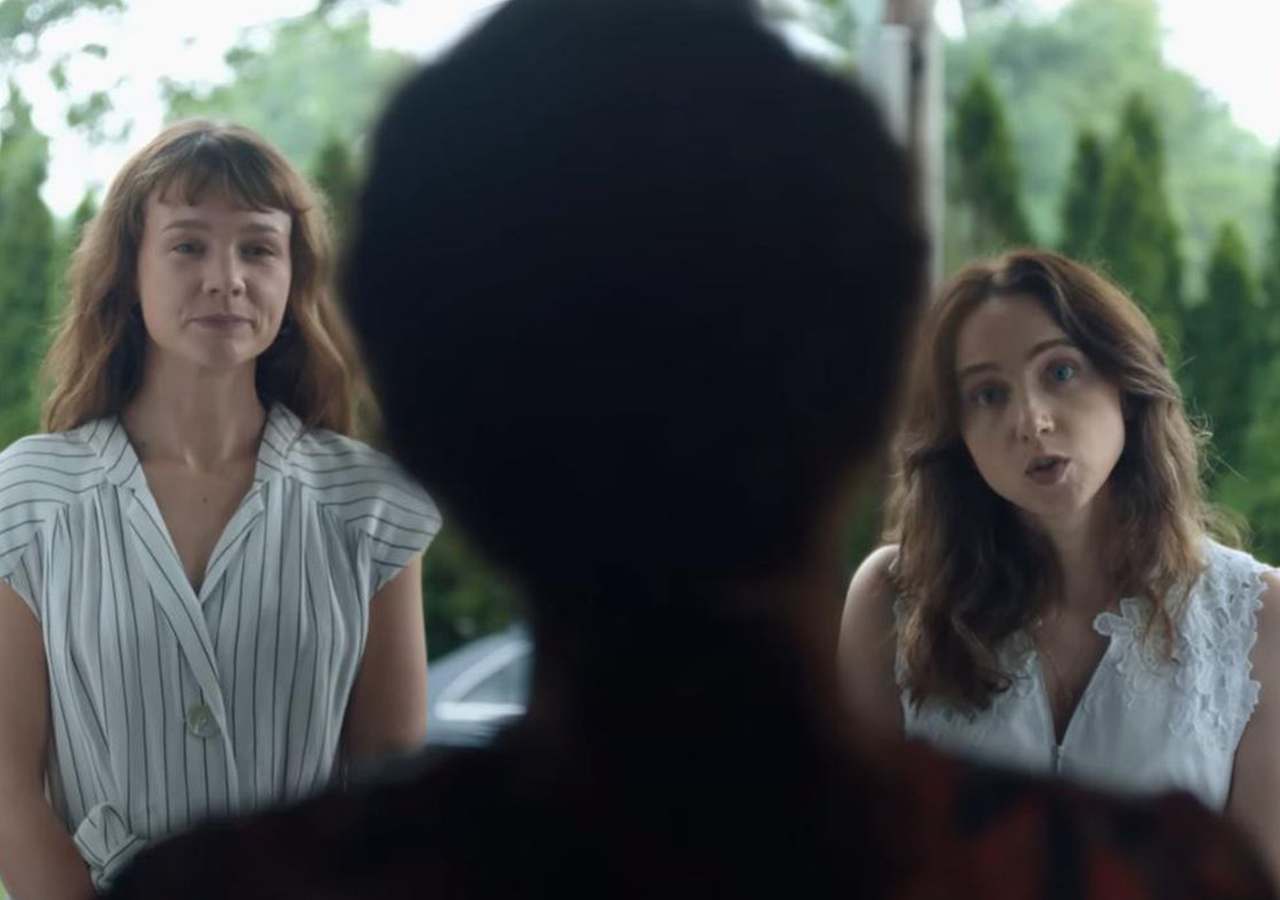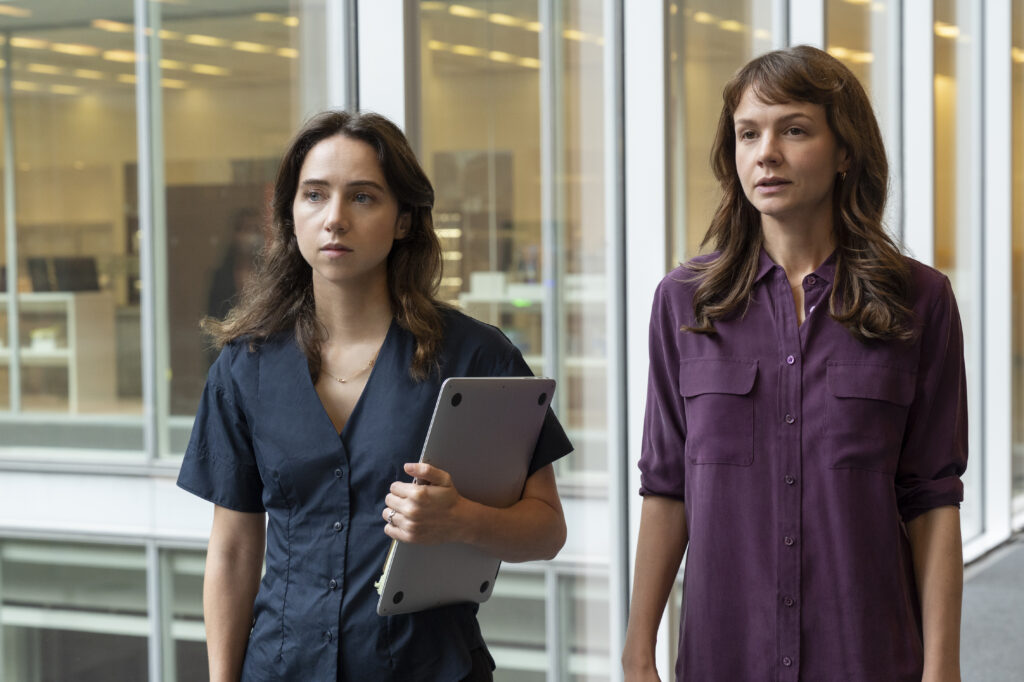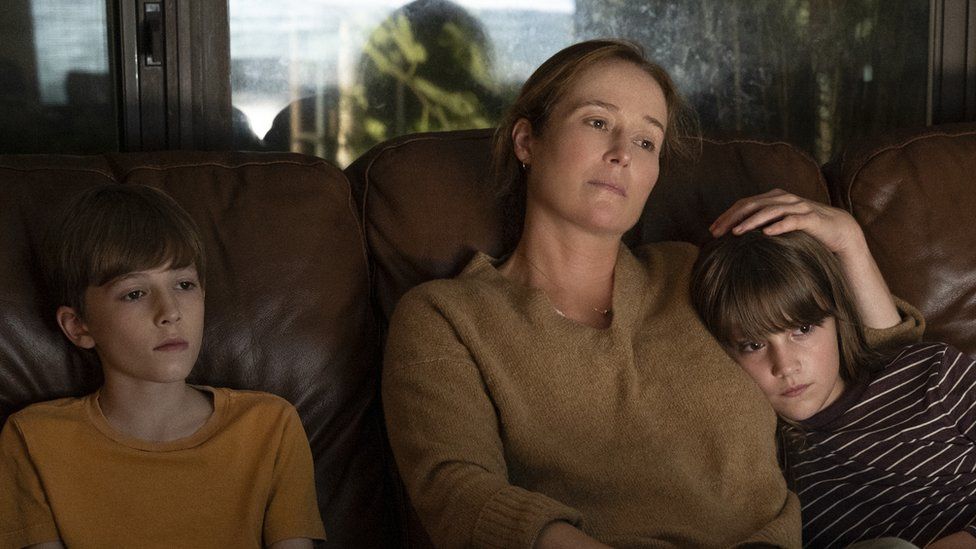Midway through She Said, New York Times investigative reporter Jodi Kantor (Zoe Kazan) gets a late-night scoop that will help build her case against Harvey Weinstein – and immediately calls her fellow reporter, Megan Twohey (Carey Mulligan), to share the news. On answering, the first question Twohey asks is “Are you okay?” It’s a logical question whenever you receive a phone call in the middle of the night, but in this context there’s a secondary meaning. Twohey might have just been having her own nightmares about not being okay, given that she’s less than a year removed from receiving an anonymous phone call threatening to rape her, kill her and dump her in the Hudson River. That’s what investigating Donald Trump’s beauty pageant sexual assault allegations got her.
It was scary investigating Weinstein, for everybody involved, probably none more than Weinstein himself – whose perspective is thankfully not presented here. It was particularly frightening, though, if you were a woman, not to mention a mother, in the crosshairs of angry men. Trump himself is recreated chillingly through a phone call with Twohey early on in the film, and the rage emanates from Weinstein’s voice the few times he’s heard on the phone. Director Maria Schrader makes the same choice Kitty Green made in the thinly veiled Weinstein movie The Assistant, never showing the face of a man who caused so much harm to so many young women who worked with him, or wanted to. His face can go away for a while, thank you. (And has, as Weinstein is currently serving a 23-year prison sentence thanks to the reporting of these two women.)
For Twohey, Trump’s election was one of the final events of her pregnancy, and becoming a new mother led to postpartum depression that might have been sprinkled with elements of the last story she reported. She’s contacted by Kantor in the wake of the firing of Fox News personality Bill O’Reilly, as Kantor’s editor, Dean Baquet (Andre Braugher), believes there now may be the traction necessary to investigate workplace sexual harassment. Vague accusations had swirled around the head of Miramax films for years, with actress Ashley Judd calling Weinstein out without naming him, and rumours of a non-consensual encounter with actress Rose McGowan. As they start to dig, Kantor and Twohey uncover fragments of numerous similar stories, involving Weinstein showing up to a business meeting in his hotel room wearing only a bathrobe, and things getting exponentially worse from there.
However, as most of the women who settled with Miramax have signed non-disclosure agreements, there’s a lot of slamming of doors and hanging up of phones as the reporters try to get someone to go on the record. She Said is the blow-by-blow recounting of their gradual amassing of evidence and willing witnesses, most of whom won’t be quoted and only want to provide background for the story. Without anyone who commits to going on the record, though, they won’t have a story.
As they get involved specifically with the story of Weinstein’s assistants from 25 years ago – who will put a more relatable face on the story than just that of the famous Hollywood actresses – they start to get closer to their white whale, so to speak. (Sorry, that’s not meant as a dig at the oversized body of Harvey Weinstein, though if anyone deserves that sort of mean-spirited insult, it’s him.) The closer they get, though, the more they see mysterious black vans following them at night. The intimidation is real.
For a movie about Hollywood actresses, the performances of its two lead actresses are the heart and soul of She Said. Mulligan and Kazan are doing some of their best work here, refusing to give us the sort of simplistic portrayal that would undermine their complexity as human beings. Surely the temptation would have been to make these characters beyond reproach, given the heroic work they are doing – proven all the more heroic by the massive exposure of Hollywood’s worst creeps and systemic failings that their work spotlighted. (The word “spotlight” was chosen intentionally there, given that this movie follows a similar template to the 2015 best picture winner about the Catholic church sexual molestation scandal.)
Kazan and Mulligan resist that temptation, though, particularly dismissing any instinct toward turning them into Mary Sues. One of the joys here is seeing Kazan cry happy tears after some break in the story puts them closer to their goal. A tough woman should never cry? Bollocks. These are human beings run ragged by learning about the most despicable behaviour men can display, all while looking over their shoulder and worrying that if their reporting is not absolutely watertight, they’ll be sued, not to mention blow their opportunity to effect change. Emotional releases were surely a key survival mechanism, and those emotions translate to us in the audience watching them.
Two other women really stand out here, and then a third who we’ll get to in a moment. Former assistants played by Samantha Morton and Jennifer Ehle are each given extended scenes recounting interactions with Weinstein when they were young women just starting out. These scenes also avoid the showier instincts of potential Oscar clips, as the actresses really get inside feelings and cost-benefit analyses that they were ill equipped to process at that age. Both actresses take your breath away with the nuance they bring.
Then there’s the one actress playing herself, Ashley Judd, who was the driving force among the actresses willing to hold Weinstein accountable. The fact that they didn’t get another actress to play Judd reminds us how recently this all was, and how real it still is. Judd doesn’t have a scene like the two above, but her mere presence is enough to elevate the stakes to where they really belong.
One man is worth highlighting here. Giving us a real sense of how things are done in a newsroom, in a delicate situation like this one, is Andre Braugher as the Times executive editor. While both Kantor and Twohey are deferential when speaking to their sources, mostly because only sympathetic sources would speak to them, Dean Baquet is only too eager to politely hang up on someone like Harvey Weinstein as soon as he starts foaming. “I’ve got a newspaper to run, goodbye Harvey,” is a typical line of dialogue. The three of them, along with a mentor played by Patricia Clarkson, give a multi-faceted portrayal of the press’ refusal to be pushed around.
If She Said isn’t as good as some of cinema’s seminal documents of investigative reporting, such as All the President’s Men and the aforementioned Spotlight, it at least belongs in the same conversation. Like those two films and others of their ilk, with Kantor and Twohey serving as a sort of distaff Woodward and Bernstein, it develops the tense momentum of a thriller — its every conversation adding a piece to the puzzle, its every twist and turn moving us closer to a righteous outcome. Even if we’d rather not hear about some of the grizzly details, they are presented engrossingly, with solid performances and execution at every turn. If we don’t want to hear those details, imagine what it was like having them done to you. She Said is the kind of vital work that should help prevent Hollywood from backsliding into its darker history.
She Said is currently playing in cinemas.



